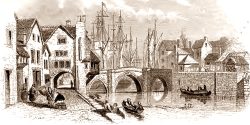Especially the Loyal Quantock Lodge of Odd Fellows of Nether Stowey
The Odd Fellows started as a fraternal society, not too dissimilar to the Freemasons, but by the time they came to Bridgwater it had become more of a mutual aid society, offering sick benefits, health insurance and other benefits that were badly needed in industrial Britain, in an age before the Welfare State provided a universal safety net.
Many of the documents and material objects shown here were kindly supplied by Steven Scarrott. These were kept in a wooden trunk of the Loyal Quantock Lodge. They had been in the possession of William (Bill) Redding, a Nether Stowey Farrier, who presumably acquired them from his father. The majority of the documents date to the 1930s. Bill left an oral history recording in 1988, which partly details the Odd Fellows actvities.
Jarman’s 1889 History of Bridgwater gives the following account of the establishment of the Odd Fellows in Bridgwater (edited here, but consult this page for the fuller version).
“In 1843 a strong effort was made to plant the standard of the Manchester Unity of Oddfellows in Bridgwater, and to this end Mr. Samuel King set himself to work. He was at that time a member of the “Bird-in-Hand” Lodge, Swansea, and there were several other Oddfellows in the town who belonged to Lodges in various parts of the country, including Mr. Charles Atkins, Mr. George Guy, and Mr. J. Tweedy. Mr. King succeeded in obtaining their co-operation, and also the assistance of the late Mr. Richard Axford and some other gentlemen. The members mentioned decided to draw their clearances from their respective Lodges with the view of forming a local branch.
“To obtain a place of meeting was no easy matter, and after an unsuccessful attempt to rent a room at the “Salmon” Inn, which stood on the site occupied by Mr. Baker’s coal-yard on the Salmon Parade, they ultimately received a hearty welcome at the “Fountain” Inn, on the West Quay, by the then landlord, Mr. John Crocker. The dispensation was brought from Bristol to Bridgwater in Capt. John Crocker’s vessel, the necessary twelve signatures having been obtained to lay before the Bristol district. The dispensation is dated July 15th, 1843, the number of the Lodge being 3,541. The first two Noble Grands were Bros. Henry Fawn and Samuel King, Bro. George Guy being the first secretary; the last named was succeeded in turn by Bros. Westlake and Whitehead, the latter being ultimately replaced by Bro. James Boulting, who held the office many years, and upon his retirement in 1872, was succeeded by the present energetic secretary, Bro. Oliver Bridges. The Lodge remained at the “Fountain” Inn from the date of formation, until the year 1888, when it removed to the Golden Ball Hotel. It was named the Loyal Fountain at the suggestion of Mr. King, whose idea of meeting every alternate Tuesday was also adopted, and has been kept up ever since. In 1888 the Lodge had 210 members, and possessed a capital of £2,150.”
That was the first lodge in Bridgwater, and several others would follow. To over see these, a district umbrella organisation was formed:
“In the year 1846 an application was made by the Fountain and Halswell Lodges to secede from their own districts and form a Bridgwater district. This request was laid before the A. M.C. of that year with the result that it was granted, and the district formally opened in July, 1846. Henry Fawn and Samuel King were the first two Provincial G.M.’s of the district, and Bro. Guy was its first C. S., but he held the office for a very short period. He was succeeded by the late Mr. Thomas Hill, who carried on business as a baker in St. John-street. Mr. Hill held the office of C.S. for 29 years with credit to himself and advantage to the Order, and to him (although not a founder) must be ascribed the honour of establishing the Bridgwater district upon a firm basis. Age and feeble health made his resignation of the office unavoidable in 1875, when another, not less zealous member was appointed in his stead, Mr. Edward Chedzey, builder. The district made rapid progress under Mr. Chedzey. He held the office for a period of eight years, and at his death, which took place in August, 1884, Mr. Oliver Bridges, the present Prov. C.S., was appointed by the district meeting, which was held at Chilton Polden in that year.”
The Odd Fellows Hall on West Quay was opened in 1911. This had been the site of the Anchor Inn.
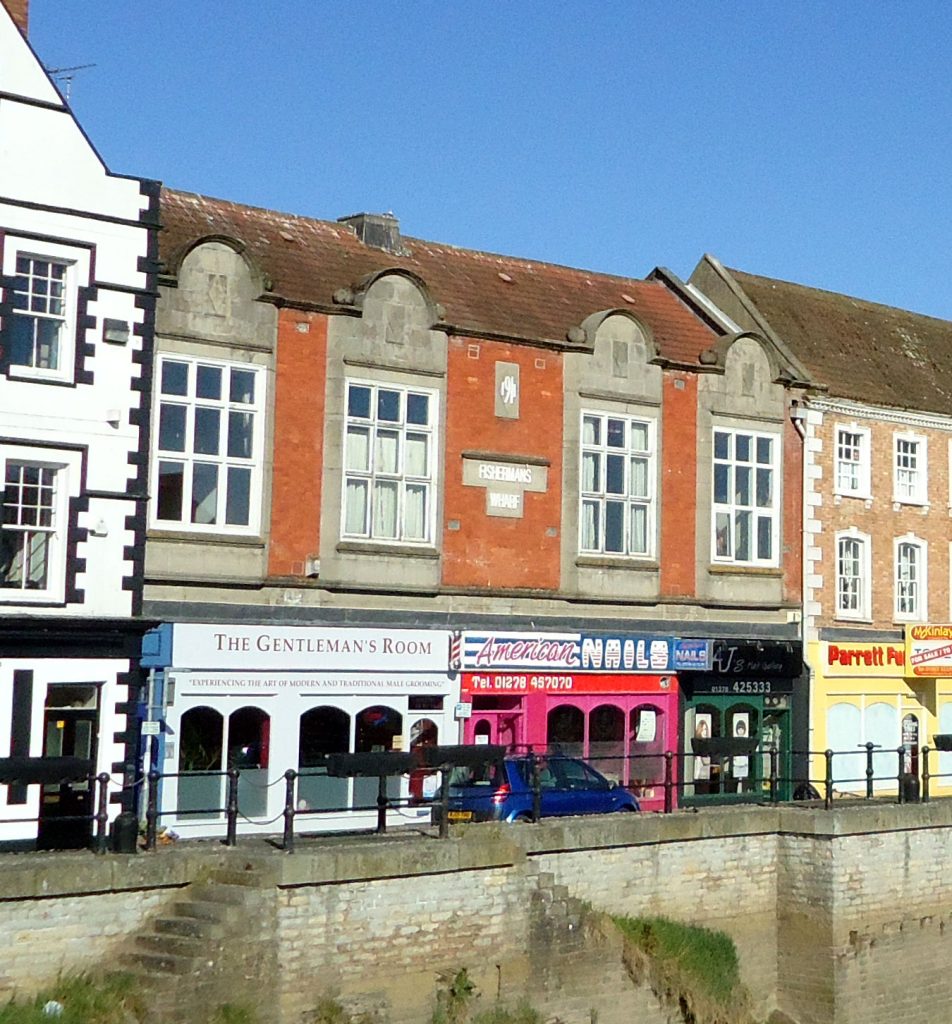
Of particular interest to the trunk of paraphernalia and documents seen below, was the formation of the Quantock Lodge:
“The Loyal Quantock Lodge opened in 1880 at the “Rose and Crown ” Inn, Nether Stowey (Host Sweeting). Last year it had a membership of 42, with a capital of £268. Its first secretary was Mr. McCullum, and its present secretary Mr. Geo. Sellick.”
The Quantock Lodge met in the Rose and Crown in Nether Stowey.
The Trunk



Contents of the Collection
Paraphernalia

The Collars
These will have been worn at meetings and for parades.












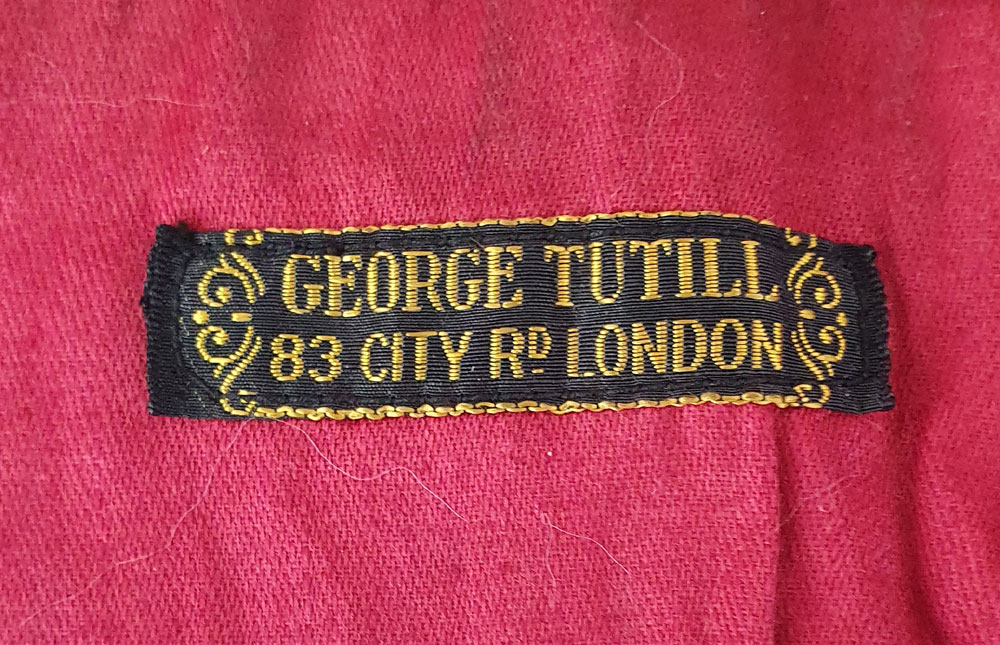
Aprons
The colours of these aprons probably corresponds with the sashes above: red for Noble Grand, pink for Vice Grand and Purple for Grand master.
Sashes





Documents
Items relating to the Local Lodges
1927 Special Rules of the Bridgwater District Branch – there is only one copy of this in the collection.













1929 Special Rules of the Loyal Quantock Lodge













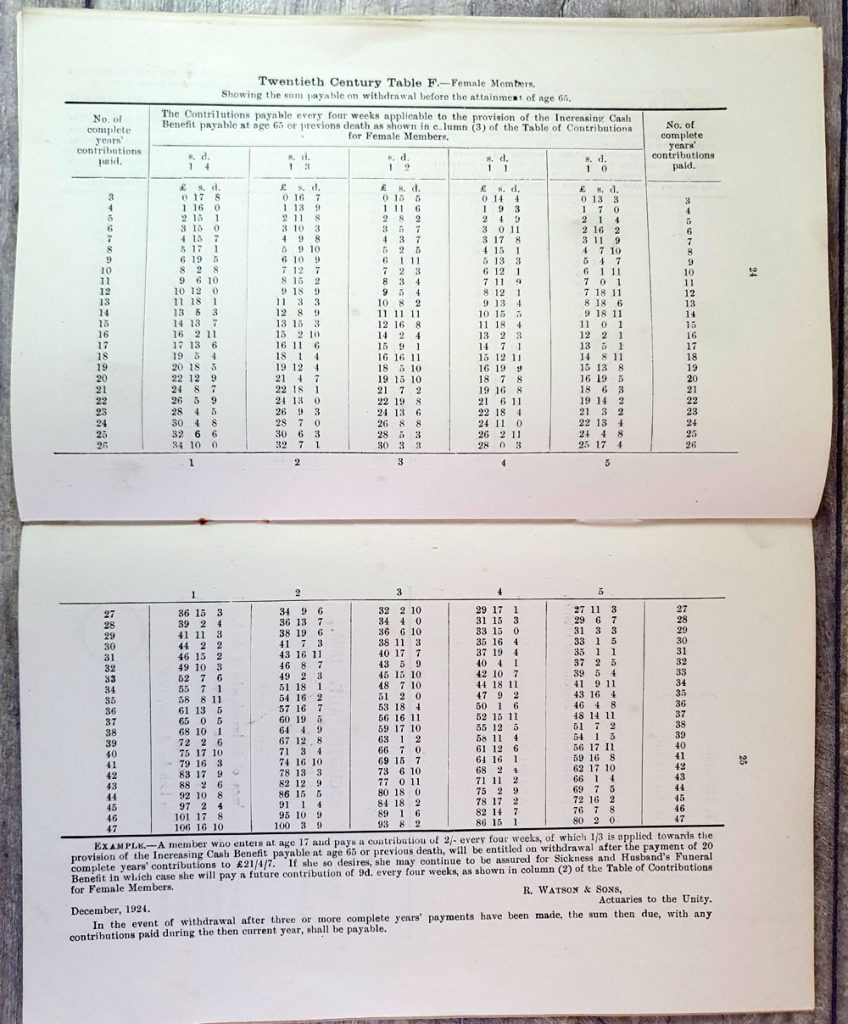


Annual Balance Sheet for the Loyal Quantock Lodge December 1931 – six copies are in the collection.



1931 Bridgwater District Annual Report for the year ending 31 December 1931. Seven copies are in the collection.










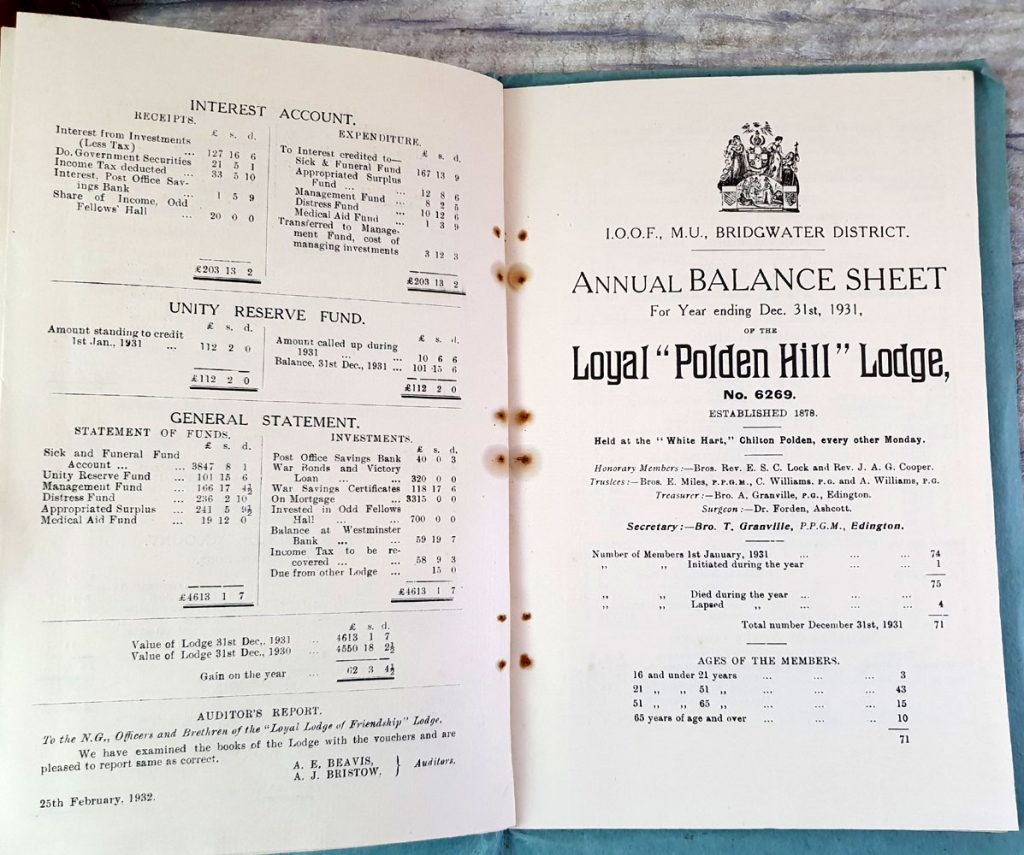
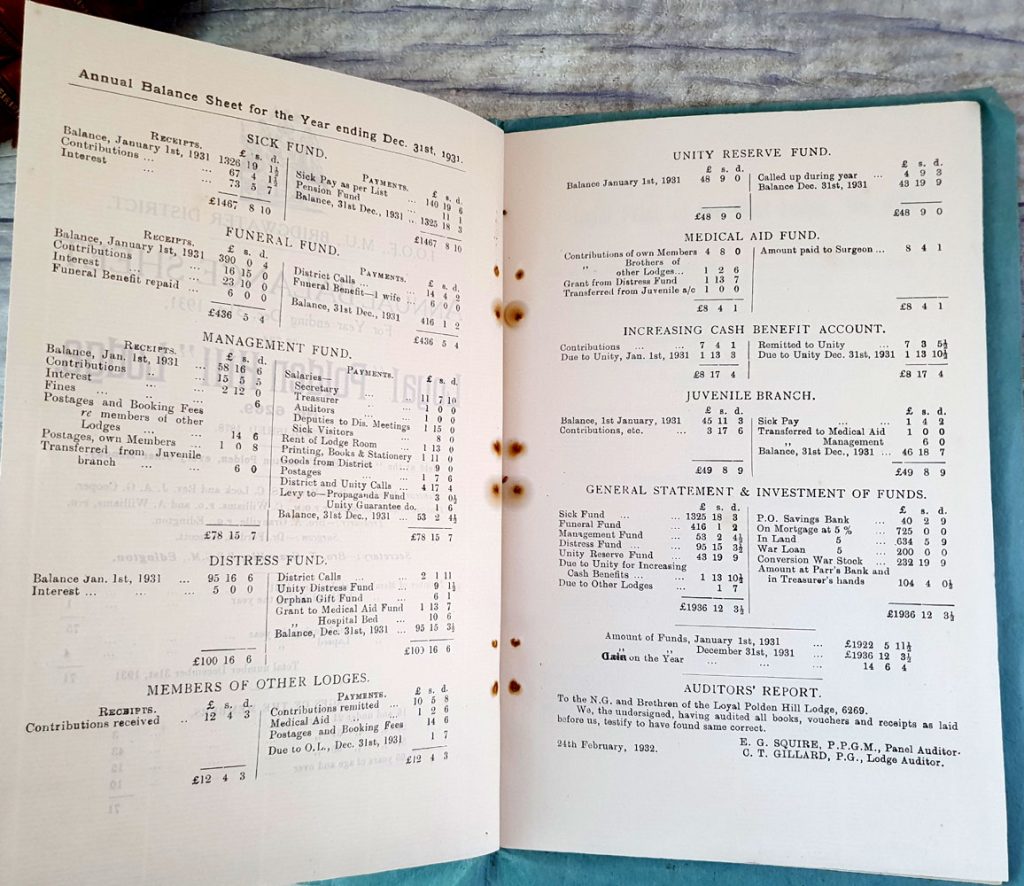






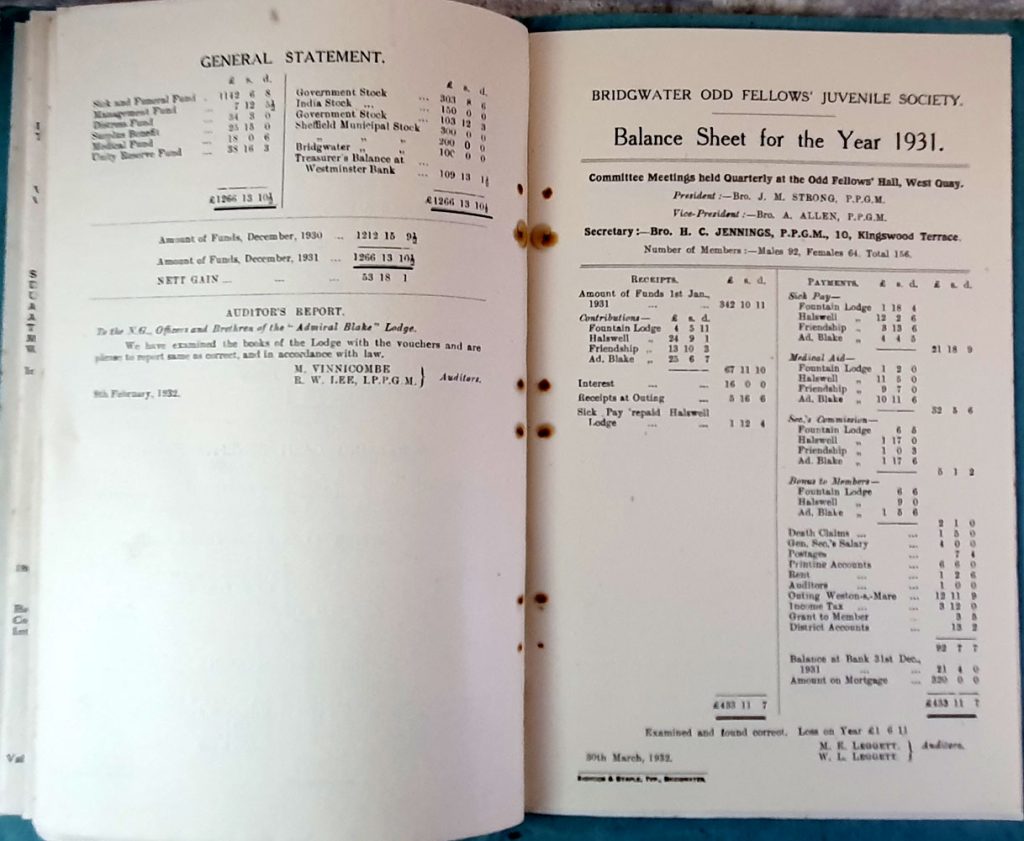




Items relating to the overall order of Odd Fellows
The oldest document in this collection is a red-leather with gold tooling bound booklet, The Lectures used by the Manchester Unity of the Independent Order of Oddfellows, Sanction and Approved by the Bristol A.M.C, June 1846. Published in 1879 in Huddersfield, by P.P.G.M. John Broadbent, High Street. This little book contains a series of short lectures, given to members as they rose through the various degrees of membership: White, then Blue, Scarlet and then Gold. For the White Degree is a lecture on Charity; for Blue a lecture on Truth; for Scarlet, Knowledge, for Gold, Science.
Although the Odd Fellows was primarily a mutual aid organisation, it carried over the aspects of a secret society it had from its early days, including degrees of membership and even secret handshakes, as this document of 1911 delightfully illustrates:

This has the handwritten signature of John [??] Polsoe. It is bound in simple green cloth.
The next document relates to disruption of the order during the First World War.



There are a couple of loose undated documents, which presumably date to earlier in the lodge’s existance.
One is a simple card listing some of the lodge members functions.

The second is essentially a hymn sheet, with the songs sung during the meetings. There are eight copies of this in the collection, seven with a grey paper cover.



Over the years the ritual and lectures of the society were incrementally modified. So in the collection are two copies of Ritual and Lectures of the Independent Order of Odd Fellows Manchester Unity Friendly Society: adopted for universal use throughout the order. Published 1930 in Huddersfield.



An undated green version is perhaps an earlier version of this document. There are six of these in the collection:


Supplements were also provided for District lodges:



While the Ritual and Lectures documents dealt with the ceremonial side of things, Rules documents dealt with the governance, finance and insurance side of the order. A 1931 paper bound book Rules of the Independent Order of Odd Fellows Manchester Unity Friendly Society, as amended at the Isle of Man (1928), Portsmouth (1929) and Plymouth (1930) A.M.C.s. Published in Manchester. Printed James Harwood Ltd. Some stapled papers of the same year, titled ‘General Rules Amendments made at Scarborough A.M.C.’ seem to add further to this volume.
These are two copies of this amendments booklet of 1931 in the collection.

For the leaders of the Quantock lodge, a full five copies are extant of the Ritual of the Independent Order of Odd Fellows Manchester Unity Friendly Society: for the use of Lodge Officers. Published in Huddersfield, P.P.G.M. F Broadbent, Printer, High Street, from 1935. This updated and expanded on the 1930 edition mentioned above.



Among the collection is a solitary copy of volume 67, no.743 of the Odd Fellows Magazine. Why this copy was kept is unclear, the contents do not seem to have any thing directly relating to the Quantock Lodge.

Of an unknown date, included in the collection are two small promotional booklets, entitled Important to Workers. How to choose a Friendly Society (Revised Edition) by Robert Annis: being a criticism and comparison of the various forms of sick benefit societies.

The largest volume in the collection is also the latest. This is the Rules of the Independent Order of Odd Fellows Manchester Unity Friendly Society: the amendments made in 1966. Published in Manchester. Printed by Arthur Gaunt and Sons Lts Heanor.



